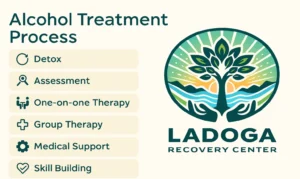You made it through detox.
You saw the fear, the tremors, the silence that screamed louder than anything you’ve heard.
Now you’ve stepped out into early recovery—and it’s empty. Everything feels raw. Everything feels possible. Everything feels terrifying.
Detox cleared your body. But it didn’t clear your mind. It didn’t soothe your heart. It didn’t answer why or who you’ll be now.
That’s where alcohol addiction treatment takes over—and it’s not a replacement of detox. It’s the work, the uncovering, the becoming that follows. At Ladoga Recovery Center in Indiana, we believe that the days after detox are the most important days—for rebuilding trust with yourself, for relearning your nervous system, for planting a foundation rather than just patching a leak.
Below is how treatment unfolds after detox, what you’ll experience, and why this phase matters more than most people tell you.
The Bridge from Detox to Treatment: Stabilizing the Inside
Detox is about external stabilization—keeping you safe through chemical withdrawal. Once that ends, treatment begins the process of internal stabilization.
You’ll enter a program that provides a structured environment—one that gradually lifts the scaffolding so you can stand on your own again.
You’ll get a personalized assessment: mental health screenings, medical review, trauma history, relationship mapping. Those things that feel like secrets now—treatment gives you a safe place to bring them forward.
You might experience shock. Post‑detox, your brain floods new signals, emotions you had locked away return. The facility doesn’t just hand you a binder and say, “Go heal.” It walks you in with intentional care: therapy, group sessions, psychiatric evaluation, coping skills, and routine.
Therapy: Facing the Silence You’ve Numbed
One-on-one therapy is where you begin asking the questions you avoided while drinking:
- Why did I feel unable to stop?
- What part of me believed drink was survival?
- Which relationships or memories did I bury to make space for alcohol?
You’ll work with a therapist who guides you into those cracks—gently. You won’t be pushed beyond what you can bear. You’ll be held while you say aloud what’s felt unnameable.
And if you don’t yet trust your voice or even know your voice—treatment gives you a voice again. That’s part of the miracle.
Group Therapy: You Are Not Alone
One of the most harrowing moments after detox is the silence. You walk into a room of strangers and your gut whispers, No one understands me. But over time, that whisper becomes something else: They do.
Group is less about therapy theater and more about connection. You’ll hear echoes of your story in others. You’ll see shame named. You’ll sometimes speak. You’ll sometimes sit quietly. But every time, you’re learning not to carry alone.
Group teaches you these things: how to sit with shame. How to listen when others are broken. How to cultivate a voice that isn’t drowned out by fear.
When someone says the thing you thought no one else ever said aloud—you’ll feel less alone. That’s how the network of recovery begins.
Psychiatric and Medical Integration: Healing the Body‑Mind Loop
Often hidden beneath “just having a drink” are diagnoses waiting for care—anxiety, depression, PTSD, sleep disorders. In treatment, the clinical side steps in. You will:
- Meet with a psychiatrist or medical provider
- Review medications (if they feel necessary)
- Monitor physical health (sleep, nutrition, labs)
- Adjust any pre-existing prescriptions safely
Sometimes in early program days, you’ll feel off balance. That doesn’t mean you’re failing. It means your brain is still adjusting. Having medical and psychiatric oversight keeps you safer and steadier through that adjustment.

Skill Building: Recovery as Craft, Not Magic
Addiction treatment doesn’t just heal what’s broken—it teaches what’s missing. You’ll work on these:
- Relapse prevention strategies: recognizing triggers, building safe plans, creating buffers
- Emotional regulation tools: grounding, breathing, naming feelings without aggression
- Mindfulness and distress tolerance: letting yourself stay with discomfort until it morphs
- Communication, boundaries, assertiveness: learning how to speak your truth without annihilation
- Self-care routines: sleep hygiene, movement, nutrition—things your body forgot
These are the muscles you’ll build in treatment. You don’t emerge perfect; you emerge stronger.
Family Healing and Reconnection
Addiction fractures trust and love. After detox, many people return to the rooms thinking they’ll just pick up where they left off. It doesn’t work that way.
Treatment often includes family therapy, codependency education, and sessions where you and loved ones begin naming pain. You’ll learn about limits, about accountability, about forgiveness—and yes, about boundaries.
Family support helps repair what was broken—not from shame, but from truth.
You may find your voice again in conversation you thought was lost. Sometimes, the hardest thing is simply healing permission to speak.
Aftercare: Mapping the Road Out
Treatment doesn’t end the day you leave. In fact, the real test begins then. That’s why treatment builds out aftercare planning:
- Outpatient therapy
- IOP or partial care options
- Peer support groups
- Sober living or transitional housing
- Alumni programs
- Check-ins and tapering support
You don’t just leave the building and go back to your old life. You step forward into something new—with a safety net beneath you.
Yes: you’ll still feel lonely. You’ll still get triggered. You’ll still face temptations. But you leave treatment better equipped—with connections, tools, strategies, and awareness.
“Will I Always Be This Raw?”
In those first few weeks after detox, everything feels raw. Guilt, grief, shame, loss, longing—they pour in. But the rawness is a kind of awakening. You’re rediscovering yourself.
Over time, you will feel softer. You will feel less brittle. You’ll wake up one morning and notice you laughed without thinking about drinking first. You’ll feel emotional, but not crippled. You’ll touch your life again—slowly, then more fully.
Healing doesn’t make you numb. Healing makes you you, again—maybe stronger, maybe freer, maybe more alive.
A Story from Someone Who’d Been There
I once met a woman, thirty-something, successful in her career, married, with two kids. By the time she came to us, she’d convinced herself she was the “exception”—that people like her shouldn’t be in treatment.
During detox, she trembled and cried, hating herself for what she’d become. After detox, she entered treatment unsure if she belonged. But as weeks passed, she recognized her own reflection in different people. She learned to name what she’d never named. She joked. She cried. She healed.
One evening, she told us: “I thought I came to treatment to not drink. I didn’t know I’d come to remember who I was under the drunk hat.”
That’s what treatment offers after detox: a path back to yourself.
Why Treatment After Detox Matters More Than You Think
Because detox only cleans the slate. It doesn’t write the story. Without treatment, detox is a volatile moment of clarity—and clarity without direction often fades.
Because pain lives in memory, relationships, shame, mental health, identity. Detox can’t heal those. But treatment can begin to round the edges, to heal toward wholeness.
Because recovery is not just about un-using. It’s about re-using yourself: your capacity for connection, creativity, meaning, purpose.
Because if you don’t do treatment after detox, you risk relapse. Not because you’re weak, but because the brain and body will always prefer familiarity—even if it kills you slowly.
Some Common Concerns, Answered in the Flow of This Road
“Will I be stuck in therapy forever?”
You’ll stay as long as you need. Over time, you taper. Tactics evolve. Therapy becomes maintenance. You don’t get trapped.
“What if I can’t afford long treatment?”
We help with sliding scales, insurance navigation, scholarship options, or stepped-down plans. You don’t lose access just because your budget is tight.
“What if I relapse days or weeks in?”
That doesn’t erase your progress. It teaches a chapter. We walk you back into recovery. You’re not kicked out for stumbling.
“What if I have to return to work or family responsibilities?”
Treatment accounts for that. Day programs, IOP, outpatient plans—care is designed to integrate with the life you have, not obliterate it.
“Will I ever feel safe outside treatment?”
Over time, yes. The goal is that treatment arms you with resilience—not dependence. You practice living between the lines of support and autonomy.
Recovering after detox isn’t perfect. It isn’t clean or linear. It is messy. It is complicated. It is–at times–almost unbearable. But it’s also a radical act of faith: in your life, your worth, your ability to heal.
You’ve done detox. You’ve proved one thing: you wanted to breathe again. Now let treatment be the air you learn to draw. You don’t have to walk it alone.
Call (888) 628‑6202 or visit our alcohol addiction treatment page to explore your next step toward healing in Ladoga, Indiana.

